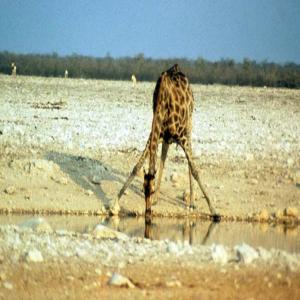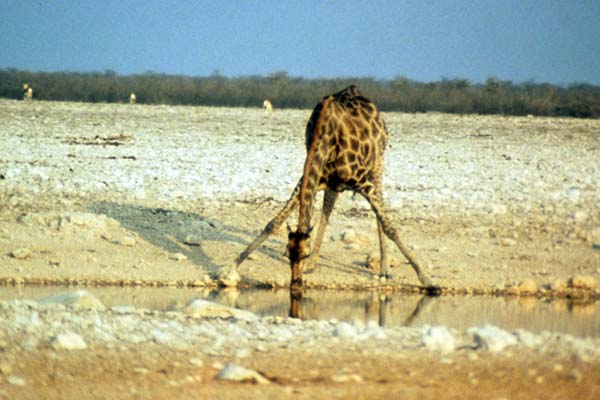Episodes

Monday Sep 15, 2014
The WildLife: Madison Vorva, Girl Scout and Teen Activist for Orangutans
Monday Sep 15, 2014
Monday Sep 15, 2014
In 2007 fellow Girl Scouts Madison Vorva and her friend Rhiannon Tomtishen embarked on a campaign to save the orangutan by targeting unsustainable palm oil production and the many products that use it, including Girl Scout cookies. Both young women have been featured on major media outlets and have won several awards for their activism, including the United Nations Forest Heroes award.

Tuesday Jan 28, 2014
Tuesday Jan 28, 2014
Kevin Bewick, head of the Anti-Poaching Intelligence Group of Southern Africa (APIGSA), provides his perspective on the fight against wildlife crime. His group undertakes investigations and focuses on intelligence gathering and research into wildlife poaching and trafficking.

Thursday Apr 18, 2013
The WildLife: CITES CoP16 Outcomes, CITES Secretary-General John Scanlon
Thursday Apr 18, 2013
Thursday Apr 18, 2013
John Scanlon, Secretary-General of the Convention on International Trade in Endangered Species (CITES), provides his perspective on the major outcomes of CITES 16th Conference of Parties, which was held in Bangkok, Thailand from March 3-14, 2013. The conversation covers overarching issues, such as enforcement, financing and political engagement, as well as species-specific items, including timber, sharks and elephants.

Sunday Feb 24, 2013
The WildLife: CITES Secretary-General John Scanlon
Sunday Feb 24, 2013
Sunday Feb 24, 2013
John Scanlon, Secretary-General of the Convention on International Trade in Endangered Species (CITES), reflects on the 40th anniversary of CITES, provides an overview of what to look for at the 16th Conference of Parties, and discusses species-specific issues, with an emphasis on elephants, rhinos and sharks.

Monday Feb 18, 2013
The WildLife: Celia's Campaign Against the Elephant Ivory Trade, Celia Ho
Monday Feb 18, 2013
Monday Feb 18, 2013
Fourteen-year-old Celia Ho from Hong Kong recently launched a campaign to stop the ivory trade after becoming inspired by Bryan Christy’s “Blood Ivory” article in National Geographic magazine. Her young voice represents a new hope for elephants that is increasing throughout Asia while her story illustrates how one person can make a difference.

Wednesday Jan 23, 2013
Wednesday Jan 23, 2013
The Rhino DNA Index System (RhODIS) is a secure database containing DNA profile data of individual rhinoceros. The extraction method has been optimized and is now used to individually identify rhinoceros horns from stockpiles and to link recovered horns to poaching cases. The information contained in this database has assisted in a number of convictions in South Africa and also one in the United Kingdom. This podcast contains a presentation on the Rhino DNA Index System that was made at the Society of Wildlife Forensic Science’s first triennial meeting in May 2012 by Cindy Harper, Veterinary Genetics Laboratory at the University of Pretoria in South Africa.

Sunday Sep 11, 2011
The WildLife: Nature Iraq, Anna Bachmann and Hana Ahmed Raza
Sunday Sep 11, 2011
Sunday Sep 11, 2011
Anna Bachmann, Director of Conservation for Nature Iraq, and Hana Ahmed Raza, their mammal specialist, discuss wildlife and nature in Iraq. They tell "The WildLife" host Laurel Neme, how, after 35 years of wars and sanctions, Iraq's environment is in dire need of care and attention. In order to rebuild the country's natural foundation, more information is needed, and Nature Iraq aims to fill some of those gaps. This episode originally aired on March 28, 2011 and was reposted on September 12, 2011.

Monday Aug 29, 2011
The WildLife: The Secret Life of Seahorses, Helen Scales
Monday Aug 29, 2011
Monday Aug 29, 2011
Helen Scales, author of Poseidon’s Steed: The Story of Seahorses from Myth to Reality, reveals the unusual anatomy and strange sex lives of seahorses. She tells “The WildLife” host Laurel Neme that seahorses live mysterious lives, tucked away out of sight on the seafloor, and provides insights into their strange characteristics, including: kangaroo-like pouches for the males to bear the young, horse-like snouts used like straws to suck in tiny zooplankton, prehensile tails to grasp sea grasses, swiveling chameleon eyes and color-changing skin. Seahorses face many threats, including habitat loss and degradation and commercial trade. They’re used in traditional Asian medicine, and also sold as curios and as aquarium pets. Global consumption of seahorses is massive, with about 25 million seahorses sold each year. There’s so much we still don’t know about seahorses. For instance, we’re not even sure how many different species there are.
Dr. Helen Scales is a marine biologist, writer, and broadcaster who specializes in fisheries, habitat protection, and the international trade in endangered species. She has lived and worked in various countries and now lives in Cambridge, England where she works as a consultant for a number of conservation groups including the International Union for the Conservation of Nature, Natural England, and TRAFFIC International. For her PhD from the University of Cambridge she studied the loves and lives of one of the biggest coral reef fish, the Napoleon wrasse, and its imperiled status due to demand from Asian live seafood restaurants.She appears as a radio host on the BBC’s The Naked Scientists show and on BBC Radio 4’s Home Planet. She also produces and presents a new podcast series, Naked Oceans, a fun and informative exploration of the undersea realm. In her first book, Poseidon’s Steed: The Story of Seahorses from Myth to Reality, she explores humankind’s thousand-year fascination with seahorses. This episode of “The WildLife” originally aired on The Radiator, WOMM-LP, 105.9 FM in Burlington, Vermont on January 17, 2010. It was reposted on August 22, 2011.

Monday Aug 22, 2011
The WildLife: Primate Smuggling and Tarantula Trade, David Kirkby
Monday Aug 22, 2011
Monday Aug 22, 2011
David Kirkby, veteran U.S. Fish and Wildlife Service (FWS) Special Agent, talks about wildlife law enforcement. He tells “The WildLife” host Laurel Neme about two of his most prominent cases: smuggling of primates for research institutions; and Operation Arachnid, an undercover investigation into the illegal trade in tarantulas.
David Kirkby was a US FWS Special Agent for twenty years, from 1988 until he retired in 2008. Raised in North Canton, Ohio, Kirkby worked for years in the federal wildlife refuge system, starting in the west desert of Utah before moving to Montana’s Lee Metcalf Wildlife Refuge, and then the Crab Orchard Wildlife Refuge in southern Illinois. From there, he moved into US FWS’s law enforcement division, first as a wildlife inspector at O’Hare International Airport in Chicago. That helped prepare him for another shift, as a special agent. In 1988, after additional extensive training, he began as a FWS Special Agent, with his first duty station in Montgomery, Alabama. Eventually, Kirkby moved back to Chicago, where he pursued numerous complex multi-year undercover investigations, including ones on primate smuggling and on the pet tarantula trade. This episode of “The WildLife” was posted on August XX, 2011.
The WildLife is a show that explores the mysteries of the animal world through interviews with scientists, authors and other wildlife investigators. It airs every Monday from 1-2 pm EST on The Radiator, WOMM-LP, 105.9 FM in Burlington, Vermont.

Monday Aug 15, 2011
The WildLife: Commercial Porcupine Farming in Vietnam, Emma Brooks
Monday Aug 15, 2011
Monday Aug 15, 2011
IUCN program officer Emma Brooks discusses illegal wildlife trade in Vietnam and her research on how commercial farming of a traded species, like porcupines, affects both the species and the trade. She tells “The WildLife” host Laurel Neme how most animals in Vietnam’s wildlife trade end up on the plates of wealthy restaurant patrons. In Vietnam and elsewhere, commercial wildlife farming, meaning the breeding of wild species for legal sale, is often promoted to supply demand while preventing overhunting in the wild. However, in a study on the conservation impact of commercial wildlife farming of porcupines in Vietnam published in August 2010 in Biological Conservation, IUCN program officer Emma Brooks concluded that commercial porcupine farming is instead having the opposite effect.
Emma Brooks has been involved with numerous conservation projects around the world, from biodiversity surveys in Mozambique to Giant River Otter counts in Bolivia. She first became interested in wildlife trade issues during her MSc at the University of East Anglia, UK. Her research in the trade in porcupines formed her dissertation topic, for which she spent three months collecting data and interviewing locals in northern Viet Nam. Emma now works for the IUCN, as part of the Global Species Programme based in Cambridge, UK. Her work includes assessing the extinction risk of species from around the world for inclusion on the IUCN Red List of Threatened Species, as well as using the information gathered to analyze species richness, major species and habitat threats, and important areas for biodiversity. The importance of species, ecosystems and services to human livelihoods and wellbeing is increasingly being recognized, and she works in a number of areas to provide the information to support decisions for the protection of species and livelihoods. This episode of “The WildLife” was posted on August 15, 2011.
The WildLife is a show that explores the mysteries of the animal world through interviews with scientists, authors and other wildlife investigators. It airs every Monday from 1-2 pm EST on The Radiator, WOMM-LP, 105.9 FM in Burlington, Vermont.
